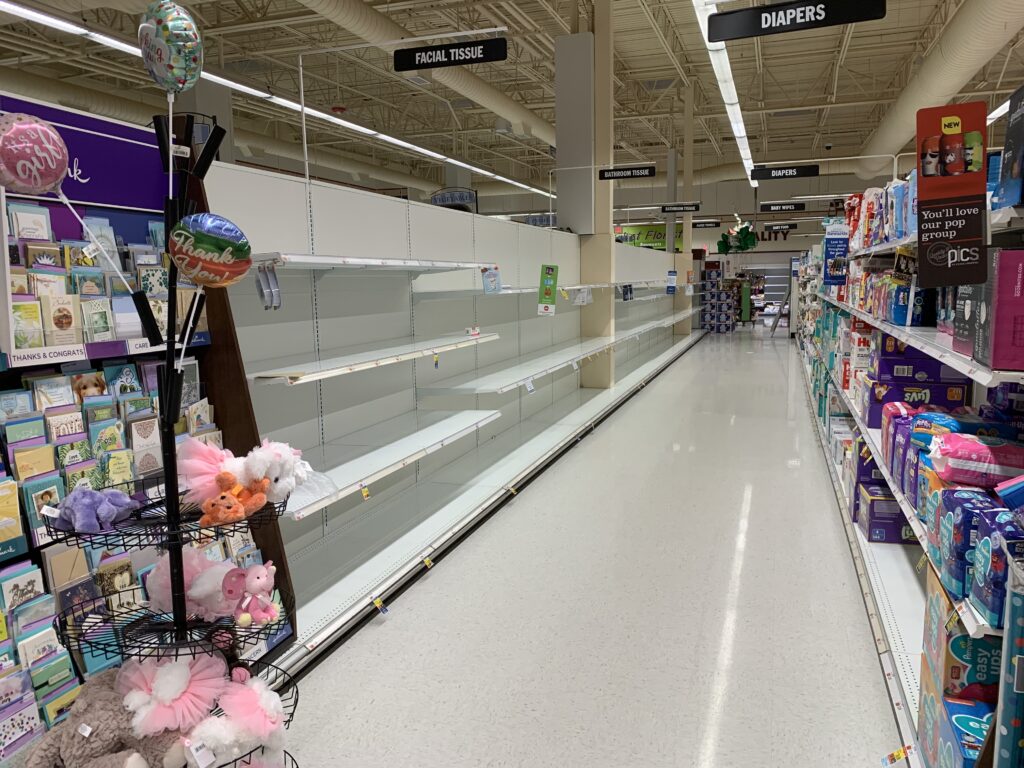Coronavirus forces postponement of Town Meeting, Boston Marathon

Shelves were bare at the Hopkinton Price Chopper on March 15 as people hoarded facial tissue, toilet paper and paper towels. PHOTO/JERRY SPAR
Like the rest of the world, Hopkintonians have entered uncharted territory. And that territory is in their own homes.
Told to minimize contact with other humans during the coronavirus pandemic, residents hunkered down for what could be a few weeks but what appears increasingly likely to be longer.
Hopkinton Public Schools students were told to stay home March 11, and it went from a one-day order to three days to almost a month. College students were sent home for the entire semester.
All town buildings were closed to the public. Parks, playgrounds and playing fields were closed. Milford Regional Medical Center announced that it was not allowing visitors, with very limited exceptions, and all individuals are being screened before being allowed to enter the hospital.
Annual Town Meeting, originally scheduled for May 4, was pushed back to June 22, and the Town Election will follow at a later date to be determined (it first requires special legislation).
“This is a very strange set of circumstances in everybody’s life, that’s for sure,” said Select Board member Brian Herr, a parent of two Hopkinton school students, two college students and a grown adult. “We had a much larger house in Hopkinton that we sold last year. Now I’m kind of scratching my head a little bit. Because we’re in a much smaller house — a great house, in the center of town, but it is a little tight at the moment. We thought we’d be down two kids, but now we have them back. We’re adjusting.”
Herr might otherwise consider himself fortunate for having sold his house last year, as the coronavirus outbreak has made things challenging for real estate brokers.
“We’re kind of staying on the national norm — no group meetings, encouraging people not to meet face to face unless they absolutely have to,” said RE/MAX Executive Realty co-owner Chuck Joseph. “But we have some sellers who say, ‘Look, I need to sell my house, I want to keep selling it.’ We have buyers who say, ‘I want to go looking at homes.’ But both parties have to agree, because we also have sellers saying, ‘I don’t really want anyone in my house right now.’ It’s a very fluid process at the moment.”
Joseph said he is hopeful the shutdown won’t continue much longer, as it could lead to a major problem for the real estate market.
“I don’t believe it will have a long-term effect, because here in the Northeast we’re still in pretty much a very, very low inventory state and a high-demand state,” he said. “To me it’s more of a general economic question, and that is: How hard will people get hit? If people get hit pretty hard for a sustained period, then it’s going to slow us down.”
Restaurants were told by the state to limit their services to take-out or delivery, as part of the guidance to avoid large gatherings. The situation has put almost all businesses in a tough spot.
“We’re concerned about the small businesses that have already started feeling the impact,” said Hopkinton Chamber of Commerce executive director Tim Kilduff. “Some of these shops, like The Spoon, that rely on walk-up traffic, they started to feel it [in early March].”
One of the biggest drivers of the local economy is the Boston Marathon, and while it won’t be held in April for the first time in its 124-year history, the event will go on, having been postponed to Sept. 14 (see Page 7).
Most other events scheduled for March and April have been postponed, canceled or altered so that they can be held remotely.
Health Department director Shaun McAuliffe, appearing before the Select Board on March 17, said Hopkinton had three known cases of people with the virus and 22 who were being monitored.
However, he noted, “We do not have evidence of community spread,” which he attributed to the efforts of his staff and school nurses who shifted to his department when the schools were closed. They traced the case’s histories and tracked who they had come in contact with recently.
“Our mitigation strategy is designed to slow the spread of the disease within the community,” McAuliffe said. “We’re focused on protecting the most vulnerable population, preserving the public safety and healthcare workforce, and to minimize the social and economic impacts of COVID-19. Individuals, businesses and the community are all part of this mitigation strategy.”
Anyone who suspects they might have coronavirus should contact their primary care physician first and then the Health Department, which can help people navigate the process of obtaining testing, McAuliffe said.
Symptoms include fever, cough, shortness of breath, chills, muscle aches, runny nose, sore throat, nausea/vomiting, abdominal pain and diarrhea. Most people will only have mild symptoms — if any. The elderly and those with existing health issues are most at risk.
“We are less concerned about how many people will contract COVID-19 and more concerned about who will contract COVID-19,” McAuliffe said.
For those looking to help fellow residents, suggestions include donating food or funds to the Project Just Because food pantry (projectjustbecause.org), or donating money to provide meals to Hopkinton Public Schools students in need (send checks to Michelle Babin, Hopkinton Middle School, 88 Hayden Rowe St., Hopkinton, MA 01748).
Residents also are encouraged to reach out to elderly neighbors to ensure they have what they need, maintain a safe distance from others (6 feet) and practice proper hygiene, especially thorough hand-washing.
Check the town’s dedicated website page (hopkintonma.gov/covid-19) or the new Hopkinton Independent website (HopkintonIndependent.com) for more information on COVID-19, its effect on the community, and best practices for staying healthy.














0 Comments